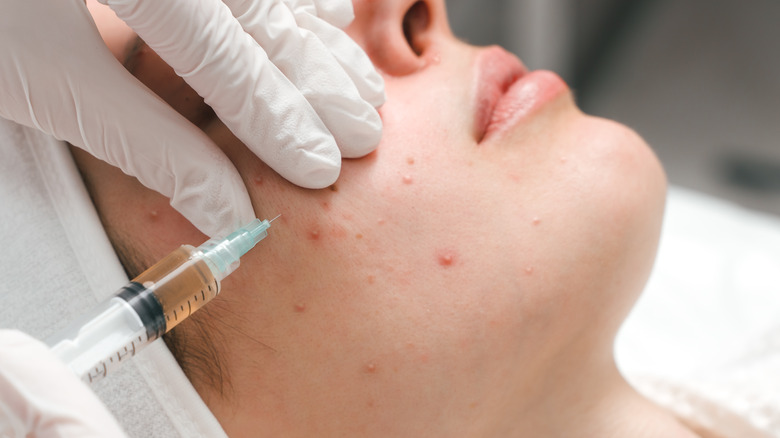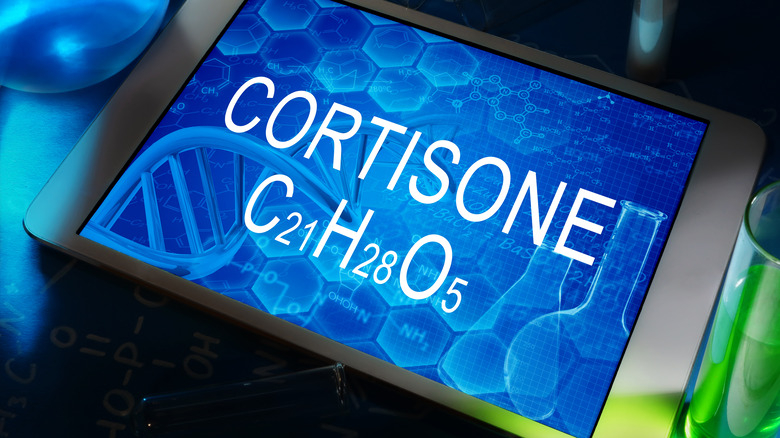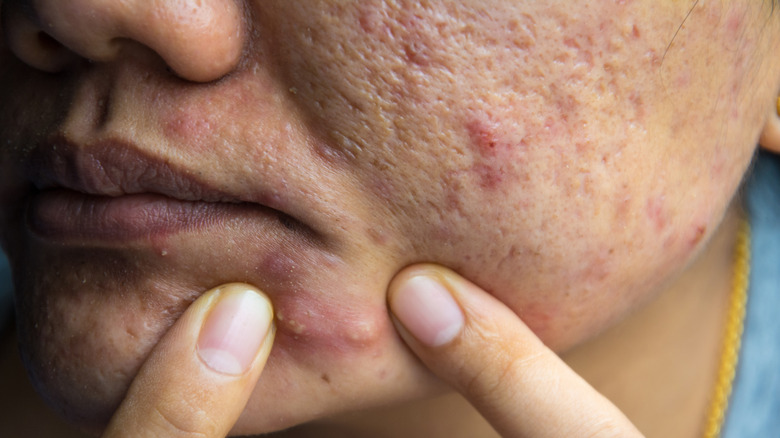The Truth About Cortisone Shots As An Acne Cure
Have you ever considered getting cortisone shots for acne? If not, you may want to think twice before taking this step, as the treatment is only recommended in severe cases. As dermatologist and associate clinical professor at Yale School of Medicine, Mona Gohara, tells Cosmopolitan, "The shot delivers the cortisone directly to the pore and the surrounding skin to shut the inflammation down and help your skin heal faster and calmer." In other words, this is likely not needed for your standard blackhead or pesky hormonal breakout.
Secondly, make sure you have realistic expectations. Cortisone shots may or may not work, depending on your skin condition and the severity of your acne. "You don't know a zit's growth potential when you're injecting it," notes Dr. Gohara. You'll also need to consider the potential side effects, because cortisone is a steroid, and most steroids carry health risks. For example, people who get cortisone shots for arthritis and other inflammatory conditions may experience nerve or cartilage damage, blood sugar spikes, or thinning of the skin around the injection site, warns the Mayo Clinic. The side effects are dose-dependent.
How do cortisone shots work?
Cortisone shots are normally prescribed for joint pain and inflammation. Per Mayo Clinic, this medical procedure can relieve the symptoms of tendinitis, gout, back pain, bursitis, and rheumatoid arthritis. According to Verywell Health, the injection contains cortisone — a steroid medication related to the stress hormone cortisol — along with a local anesthetic. Its effects kick in within a few days and can last several weeks. Though the treatment may reduce inflammation and relieve pain, it is not for everyone. In some cases, it can cause facial flushing, high blood sugar, infection, tendon rupture, or loss of fatty tissue, as Verywell Health reports. Patients may also experience pain within the first 24-48 hours of receiving a cortisone shot, although severe adverse reactions are rare.
Depending on their composition, cortisone shots may also help with nodular or cystic acne. In these cases, dermatologists will inject triamcinolone or other corticosteroids into the affected areas to bring down inflammation, per the Journal of Clinical and Aesthetic Dermatology. According to research published in the outlet, the most commonly used dose is 2.5 milligrams per milliliter. Unfortunately, more than half of practitioners fail to warn their patients about the potential side effects.
What should you know before getting cortisone shots for acne?
Cortisone shots are injected directly into cysts, pustules, nodules, and other acne lesions. This allows the active substance to penetrate more deeply than topical creams and serums, as board-certified dermatologist Emily Schwarz, Ph.D. explains, via Schwarz Dermatology. Not only does the treatment decrease inflammation, but it may also prevent scar formation and improve the appearance of scar tissue. However, this doesn't mean you should resort to cortisone shots at the mere sight of a pimple on your face or neck. In a November 2021 interview with Brydie, dermatologist Loretta Ciraldo cautions that cortisone shots "are best for people who have just one or two lesions that are much more advanced than the rest of their acne." She adds, "For people who have more widespread cystic and inflamed acne lesions, a more systemic or global therapy is necessary." Dr. Ciraldo also recommends telling your doctor to start with a small dose, which may help prevent soft tissue atrophy following the procedure. Even so, there's still a risk of long-term scarring and discoloration of the skin.
Note that you may need several shots to achieve the desired result, which can increase the risk of side effects. Another aspect to consider is that cortisone shots can only improve your symptoms and speed up healing, but they won't prevent or cure acne, per Ananya Aesthetics. Simply put, a cortisone shot is just a temporary solution.


